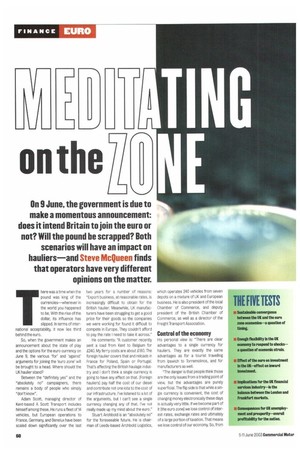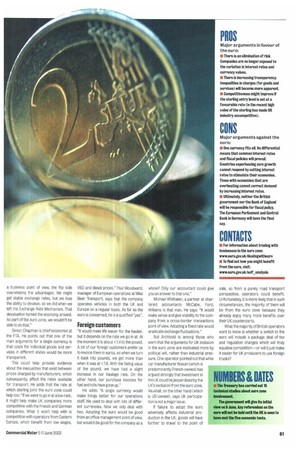mine
Page 60

Page 61

If you've noticed an error in this article please click here to report it so we can fix it.
On 9 June, the government is due to make a momentous announcement: does it intend Britain to join the euro or not? Will the pound be scrapped? Both scenarios will have an impact on hauliers—and Steve McQueen finds that operators have very different opinions on the matter.
There was a time when the pound was king of the currencies—wherever in the world you happened to be. With the rise of the dollar, its influence has slipped. In terms of international acceptability, it now lies third behind the euro.
So, when the government makes an announcement about the state of play and the options for the euro currency on June 9, the various 'for' and 'against' arguments for joining the 'euro zone' will be brought to a head. Where should the UK haulier stand?
Between the "definitely yes" and the "absolutely no" campaigners, there remains a body of people who simply "don't know".
Adam Scott, managing director of Kent-based A Scott Transport includes himself among these. He runs a fleet of 14 vehicles, but European operations to France, Germany, and Benelux have been scaled down significantly over the last two years for a number of reasons: "Export business, at reasonable rates, is increasingly difficult to obtain for the British haulier. Meanwhile, UK manufacturers have been struggling to get a good price for their goods so the companies we were working for found it difficult to compete in Europe. They couldn't afford to pay the rate I need to take it across."
He comments: "A customer recently sent a load from Kent to Belgium for £240. My ferry costs are about £180. The foreign haulier covers that and reloads in France for Poland, Spain or Portugal. That's affecting the British haulage industry and I don't think a single currency is going to have any effect on that. (Foreign hauliers] pay half the cost of our diesel and contribute not one iota to the cost of our infrastructure. I've listened to a lot of the arguments, but I can't see a single currency changing any of that. I've not really made up my mind about the euro."
Stuart Archbold is an "absolutely no" for the foreseeable future. He is chairman of Leeds-based Archbold Logistics, which operates 240 vehicles from seven depots on a mixture of UK and European business. He is also president of the local Chamber of Commerce, and deputy president of the British Chamber of Commerce, as well as a director of the Freight Transport Association.
Control of the economy
His personal view is: "There are clear advantages to a single currency for hauliers. They are exactly the same advantages as for a tourist travelling from Ipswich to Torremolinos, and for manufacturers as well.
"The danger is that people think those are the only issues from a trading point of view, but the advantages are purely superficial. The flip side is that while a single currency is convenient, the cost of changing money electronically these days is actually very little. if we become part of it [the euro zone] we lose control of interest rates, exchange rates and ultimately of a large portion of taxation. That means we lose control of our economy. So, from a business point of view, the flip side overwhelms the advantages. We might get stable exchange rates, but we lose the ability to devalue, as we did when we left the Exchange Rate Mechanism. That devaluation turned the economy around. As part of the euro zone, we wouldn't be able to do that."
Simon Chapman is chief economist at the FTA. He points out that one of the main arguments for a single currency is that costs for individual goods and services in different states would be more transparent.
This could help provide evidence about the inequalities that exist between prices charged by manufacturers, which subsequently affect the rates available for transport. He acids that the rate at which sterling joins the euro zone could help too: "if we were to g0 in at a low rate, it might help make UK companies more competitive with the French and German companies. What it won't help with is competition with operators from Eastern Europe, which benefit from low wages, VED and diesel prices." Paul Woodward, manager of European operations at Mike Beer Transport, says that the company operates vehicles in both the UK and Europe on a regular basis. As far as the euro is concerned, he is a qualified "yes".
Foreign customers "It would make life easier for the haulier, but it depends on the rate we go in at. At the moment it is about €1.4 to the pound. A lot of our foreign customers prefer us to invoice them in euros, so when we turn it back into pounds, we get more than when it was at e1.6. With the falling value of the pound, we have had a slight increase in our haulage rate. On the other hand, our purchase invoices for fuel and tolls have gone up."
He adds: "A single currency would make things better for our operations staff. We used to deal with lots of different currencies. Now we only deal with two. Adopting the euro would be good from an office management point of view, but would it be good for the company as a whole? Only our accountant could give you an answer to that one."
Michael Whittaker, a partner at chartered accountants McCabe, Ford, Williams is that man. He says: "It would make sense and give stability to the company from a cross-border transactions point of view. Adopting a fixed rate would eradicate exchange fluctuations."
But Archbold is among those who warn that the arguments for UK inclusion in the euro zone are motivated more by political will, rather than industrial pressure. One operator pointed out that while car manufacturer Nissan (which is predominantly French-owned) has argued strongly that investment in
the UK could be jeopardised by the UK's exclusion from the euro zone, Vauxhall, on the other hand (which is US-owned), says UK participa tion is not a major issue.
If failure to adopt the euro adversely affects industrial production in the UK, goods will have further to travel to the point of sale, so from a purely road transport perspective, operators could benefit. Unfortunately, it is more likely that in such circumstances, the majority of them will be from the euro zone because they already enjoy many more benefits over their UK counterparts.
What the majority of British operators want to know is whether a switch to the euro will include a package deal of tax and regulation changes which will truly equalise competition—or will it just make it easier for UK producers to use foreign trucks?
























































































































































































